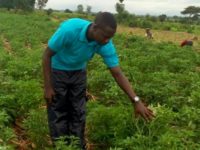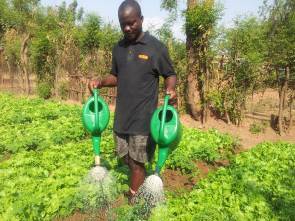 Rural women are the backbone of family farming as they account for about half of the agricultural labour force in developing countries.
Rural women are the backbone of family farming as they account for about half of the agricultural labour force in developing countries.
In spite of that, a large contribution of women’s works in family farms is not recognized in terms of income earned and access to productive resources and assets.
Dr Lamourdia Thiombiano, Food and Agricultural Organization (FAO) representative to Ghana, said in a speech read for him at a national celebration of 2014 World Rural Women’s Day at Akrofrom in the Techiman North District of Brong-Ahafo Region.
The programme, organized by Farmers Organization Network of Ghana (FONG) with sponsorship by the United States Agency for International Development (USAID), FAO, ECASARD, a Farmer-based Organization (FBO), SEND-Ghana, and Africa Lead, was attended by more than 1000 smallholder women farmers from all over the country.
Under the theme: “Women as Guardians of SEED, LIFE and EARTH”, it aimed at highlighting the role played by rural women in food production, food security and nutrition, and rural enterprises.
Dr Thiombiano expressed regret that most often the families of rural women were the poorest, hungriest and undernourished, saying that, they generally faced gender-specific constraints as agricultural labourers.
He said labour availability depended on the amount of family labour that a household could mobilize and the amount of labour that could be hired in local labour markets.
Dr Thiombiano however, stated that low levels of human capital in – education, health and nutrition – were constraints on women’s labour productivity in agriculture and other sectors.
He cited some nutritional issues like iron deficiency, which directly affected labour productivity, as widespread were especially relevant to women.
Dr Thiombiano said there was a pronounced gender division of labour, for particular agricultural tasks, with the result that male and female labour could not be easily substituted.
Dr Thiombiano thus stressed the need for stakeholders to create conditions to improve the quality of life associated with family farming since family farmers and rural women engaged in farming had the right to continue working on what they knew and enjoyed doing and producing.
He stated: “Migration to the cities should not be an obligation but should be a decision taken freely and not due to the urgent need to meet basic needs”.
Dr Thiombiano argued that enabling women to achieve their productive potential required many of the same reforms that were necessary to address constraints facing family farming units and rural people in general.
He, nonetheless, cautioned that additional care must be taken to ensure that women’s voices were heard in the design and implementation of policies and interventions.
Dr Thiombiano emphasized the need to continue providing information and raising awareness about the role and potential of women in family farm management while enabling their meaningful participation in decision making process.
This, he explained, was because rural women’s organizations were often absent from important policy discussions at national and international levels and stressed that extra efforts were needed to be made to include rural women in these deliberations.





